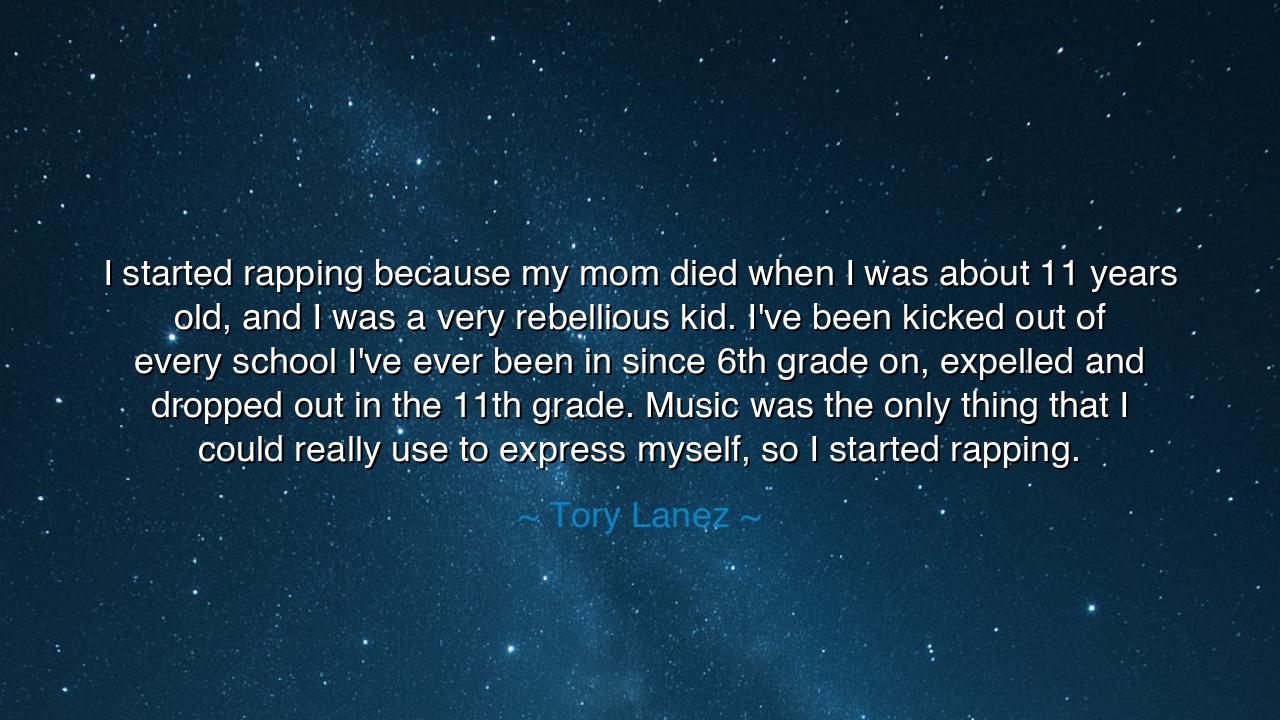
I started rapping because my mom died when I was about 11 years
I started rapping because my mom died when I was about 11 years old, and I was a very rebellious kid. I've been kicked out of every school I've ever been in since 6th grade on, expelled and dropped out in the 11th grade. Music was the only thing that I could really use to express myself, so I started rapping.






The words of Tory Lanez, “I started rapping because my mom died when I was about 11 years old, and I was a very rebellious kid. I've been kicked out of every school I've ever been in since 6th grade on, expelled and dropped out in the 11th grade. Music was the only thing that I could really use to express myself, so I started rapping,” are not merely a confession — they are a testament to the transforming power of pain. Beneath his story lies one of humanity’s oldest truths: that out of loss and suffering, creation is born. The ancients would have said that from the ashes of grief rises not only despair but also art — the voice of the soul learning to breathe again after being shattered.
When the boy loses his mother, he loses more than a parent — he loses the first mirror of love, the one who teaches him the language of belonging. At such a tender age, this absence becomes a wound that words cannot easily mend. Yet, instead of surrendering to silence, Tory turned to sound. Music became his refuge, a sanctuary for his chaos, his rebellion, and his longing. Like a blacksmith forging steel in the heat of sorrow, he shaped his pain into rhythm and rhyme. This act — to turn anguish into art — is the divine alchemy of the human spirit, a transformation as ancient as time itself.
Throughout history, this pattern repeats: grief giving birth to greatness. Consider the life of Ludwig van Beethoven, who lost his hearing yet created symphonies that spoke louder than any sound. Or think of Maya Angelou, who was silenced by trauma as a child, only to later write words that moved generations. Like Tory Lanez, they discovered that expression is salvation — that art is the bridge between agony and understanding. The ancients would call this the “hero’s rebirth,” when the soul, broken by tragedy, rises again to claim its purpose.
There is a sacred strength in what Tory describes — not in the rebellion itself, but in the way he channeled it into creation. For rebellion is not evil when guided by purpose; it is the fire that demands change. The young man who is cast out from schools, misunderstood and unruly, is not lost — he is searching for a language to tell the world what burns within him. Many crumble under such weight, but those who turn that fire into music, poetry, or vision become architects of healing. The voice that once shouted in anger learns to sing in truth.
His words remind us that pain seeks a voice, and if denied one, it will destroy the heart that bears it. But when given expression — through song, art, or honest conversation — it transforms from poison into medicine. This is the way of the soul: what it cannot speak, it must create. The ancients believed that the Muses themselves were born of sorrow, daughters of memory and loss. In every artist who writes from grief, their spirit still lives.
And yet, Tory’s story is not only about music — it is about survival. He teaches that purpose is often found not in moments of peace, but in moments of despair. The world may strip you of guidance, belonging, or direction, but if one thing remains — a spark of passion, a voice that refuses to be silenced — then that is enough to begin again. Music saved him because it gave him a way to speak when words failed, a way to be seen when the world had turned away. In that act of self-expression lies not only redemption, but freedom.
Let this teaching be carried forward: when loss comes, create. When rage burns, shape it into meaning. Do not bury your pain in silence, for silence feeds despair. Instead, take it in your hands like clay and mold it into something beautiful. Whether you write, paint, sing, or build — do it honestly. Let your suffering become your teacher, and your expression, your offering. In this way, every wound becomes a seed from which art — and wisdom — can bloom.
So remember, children of tomorrow: tragedy does not end you; it awakens you. The path of grief may lead you to rebellion, but if you follow it long enough, it leads also to truth. Like Tory Lanez, you can turn sorrow into song, and rebellion into creation. And when you do, you will find that what once broke you has become the very force that makes you whole — a melody born from pain, echoing through eternity.






AAdministratorAdministrator
Welcome, honored guests. Please leave a comment, we will respond soon